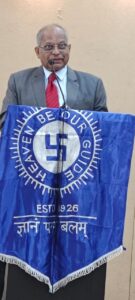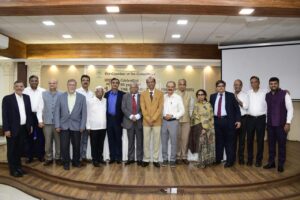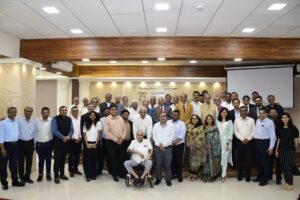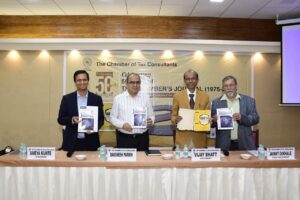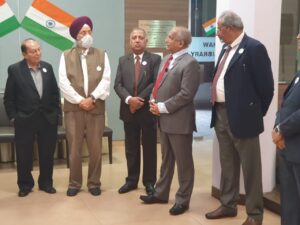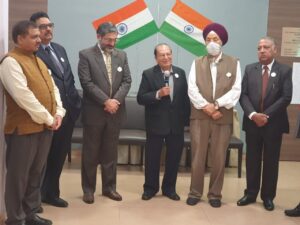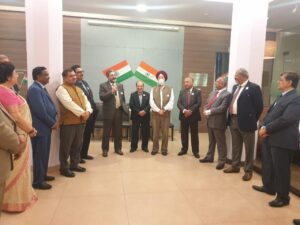Learned Senior Advocate has made various suggestions for the consideration of the Hon’ble Chairman and members of the Select Committee of Lok Sabha to examine the Income-tax Bill, 2025, Cell
(SCITB CELL). He has divided his suggestions into three parts, i.e.
(1) The provisions which are not considered in the Income-Tax Bill,2025.
(2) Few specific conceptual suggestions, and;
(3) Certain administrative measures which may be desired for better implementation of the New Income-tax Bill, 2025, and to achieve the desired objective of simplification of tax law and tax administration.
Some of the important suggestions are, Accountability in tax administration, suggestions for reducing pendency before various High Courts and the Supreme Court, increasing the scope of appeals to Income tax appellate Tribunal, Appointment of Members of the Income Tax Appellate Tribunal, Arbitration in tax matters, Independent grievance Committee – Trust Deficit, Nodal Officer, Tax Service and not collection, Major Amendments in tax laws should be made only once in five years. Independent Committee to suggest amendments to tax laws.
Editorial Board.
May 30, 2025
To,
Hon’ble Chairman,
Select Committee of Lok Sabha
to examine the Income-tax Bill, 2025,Cell
(SCITB CELL )
Parliament House Annexe
New Delhi. 110001.
Ref: Examination of the ‘Income -Tax Bill , 2025’ by the Select Committee of the Lok Sabha.
Sub: Suggestions for the consideration of the Hon’ble Chairman and Members of the committee.
Hon’ble Sir,
We highly appreciate the Introduction of the Income-tax -Bill 2025. The sincere efforts made by the committee to draft the Income-tax Bill, 2025, deserve to be acknowledged. We also acknowledge the sincere efforts of the members of the Select Committee of the Lok Sabha in interacting with various stakeholders across the country. Sir, we are sure that when the new Bill will be introduced in the Parliament, it will be the version taking into consideration of all the suggestions given by the various stakeholders. We are sure the New Income -Tax may be able to achieve the objectives of our Hon’ble Prime Minster Shri Narendra Modi, when we, as a Nation celebrate our centenary in the year 2047.
Sir, we have a few thoughts for the consideration of the Hon’ble members of the committee, which are divided into three parts,
(1) The provisions which are not considered in the Income-Tax Bill, 2025.
(2) Few specific conceptual suggestions, and
(3) Certain administrative measures which may be desired for better implementation of the New Income-tax Bill, 2025, and to achieve the desired objective of simplification of tax law and tax administration.
- The provisions which are not considered in the Income –Tax Bill, 2025
1.1 Accountability.
Hon’ble Sir, under the Income-Tax Bill 2025, there is no provision for accountability on the part of the tax administration. Dr. Raja J. Chelliah,
in his report [(1992) 197 ITR 177 (St) (257) Para 5.9], “The Assessing Officers should be made accountable for their actions. If the percentage of demands not upheld by the Tribunals is higher than a reasonable figure, say 50 per cent, the officer should be given a blank mark and reprimanded. On the other hand, an Assessing Officer should be protected and defended if he has obeyed instructions of the Board and followed case laws even though an audit might raise concerns about his actions”.
We suggest that Accountability provisions may be incorporated in the New Income-tax Bill, 2025. In Prashant Chandra v. Harish Gidwani, Dy CIT [2024] 165 taxmann.com 471 (All)(HC), in an contempt application under section 12 of the Contempt of Court Act, 1971 , which was filed alleging wilful and deliberate disobedience of the judgement and order dt. 31st March, 2015 passed by a Division Bench in Writ petition No. 9525 (MB) of 2013, the Allahabad High court held that disobedience of a Court’s order strikes at the very root of the rule of law upon which the judicial system rests. The rule of law is the foundation of a democratic society. The judiciary is the guardian of the rule of law. The Officer was held liable to pay a fine of Rs. 25,000 along with simple imprisonment for a period of one week, and was awarded to the contemnor. In Bloomberg Data Services (India) (P) Ltd. v. DCIT (2025) 302 Taxman 454 (Bom)(HC), where there was a delay in issuing the refunds, the court held that this was due to the laxity of the Department. The Court held that a refund of the tax amount, if any, ought to be immediately granted to the assessee. Delayed payment of refunds burdens the public exchequer due to interest that needs to be paid on the same. The Court also observed that Rules would be required to be framed and Accountability would be required to be fixed. In the last two years, on the basis of reported Judgements/Orders one will find there are large number of Special Leave petitions (SLP) are dismissed only on account of delay in filing of SLP by the Revenue Authorities without a proper explanation of the reasons for delay. (Refer, Radha Madhav Investments (P.) Ltd. v. Dy. CIT [2025] 302 Taxman 358 (SC) (Delay of 752 days, PCIT v. Joginder Singh Chatha [2025] 302 Taxman 5 (SC). (Delay of 233 days). One can give a list of a large number of cases which are dismissed only on account of the delay in taking up appropriate legal remedies was not properly explained. This is mainly because there is no accountability provision in the tax law. It is desirable that some accountability provision may be suggested in the proposed Bill ,so that the tax collected may be utilised for better purposes.
- Suggestions for reducing pendency before various High Courts and the Supreme Court.
1.2.1. Publication of issues pending before on direct taxes before various High Courts and the Apex Court.
Hon’ble Sir, when an Appeal or Writ Petition is filed before various High Courts, the Revenue is always either the Petitioner or Respondent. As soon as appeals are filed, the Central Board of Direct Taxes (CBDT) can get the information from the respective Commissioners inrespect of the issues pending before various High Courts and these can be compiled and published on the website of the CBDT under the legal corner. This will help both the taxpayers as well as the tax administration. When an issue came before the Hon’ble Bombay High Court, the Hon’ble Bombay High Court directed the Revenue to publish the information on their website. Though an assurance was given to the Hon’ble Bombay High Court, by filing an affidavit stating that the website would be functional from 15-6-2016, this has not been complied with. Reference can be made to CIT v. TCL India Holding Pvt. Ltd. (Bom.)(HC);(ITA No. 2287 of 2013, dt. 06.05.2016) www.itatonline.org. Hon’ble Sir, the Income Tax Appellate Tribunal has developed a system wherein the Hon’ble President of the Income Tax Appellate Tribunal gets the information from all 63 Benches across the country about how many appeals are filed in respective Benches and how many have been disposed. The list is prepared every month for the appeals filed and the disposal of appeals by the respective Members of the ITAT. Hon’ble Sir, we suggest that such a system may be adopted by the CBDT to know the pendency of appeals across the country before various High Courts and the Hon’ble Supreme Court and the issues involved. The list can be published on the website of the CBDT, which will help the Revenue as well as the Assessees.
1.2.2. Clauses, 365 to 366 .[Section.260A]: Appeals to High Court -Acceptance of orders of High Courts.
In the earlier days, whenever the Department would accept a decision of a particular High Court on the interpretation of law, the Central Board of Direct Taxes used to issue a circular stating that the judgement had been accepted. This practice seems to have been discontinued now. If this process is adopted and instructions /circulars are published, litigation will be reduced considerably and shall prove invaluable for the ease of doing business in India by bringing certainty to tax laws. The Hon’ble Bombay High Court in CIT v. TCL Ltd. (2016) 241 Taxman 138 (Bom.)(HC) has passed a detailed order asking the Chief Commissioner of Income tax to host details of the matters admitted before the Bombay High Court, matters accepted by the Revenue, etc. online. If the order of the Bombay High Court is implemented, it will surely reduce by a positive step in reducing litigation.
The CBDT vide Circular No 1 of 2011 dated April 06, 2011 (2011) 333 ITR (St) 1, Instruction No 4 of 2011 (2011) 198 Taxman 14 (St) and Instruction No 7 of 2011 (2011) 199 Taxman 26 (St) which provided guidelines to the Department for filing Appeals/SLP’s clearly records that there were several instances where Appeals were filed by the Department even though Questions of Law were not involved. This also adds to the arrears of litigation.
It has been observed that when the quantum of addition is large, though a question of fact is involved, the Revenue files an appeal invariably to avoid any query on audit in future. If the reference is rejected by the Tribunal on facts, the Revenue may not take the matter further. The High Court is the Third Appellate authority under the Income Tax law and is to entertain only substantial questions of law.
The Hon’ble Bombay High Court is presently listing final hearing Appeals which were admitted in 2003, i.e. even after more than 22 years, the appeals that truly require adjudication on points of law languish and are not decided as the High Court is burdened with needless Appeals on disputed facts.
1.2 3. Availing the services of retired judges on a ad-hoc basis:
Article 224A of the Constitution of India enables the appointment of retired judges at sittings of High Courts as ad-hoc judges. As the pendency in the various high Courts is increasing, the services of specialised ad-hoc judges may be availed for effective disposal of cases and efficient dispensation of justice. This step shall help in reducing the pendency of matters before various High Courts. This could be an effective measures to reduce the pendency of matters before various High Courts.
1.3. Sections 245B to 245M: Settlement Commission – One-time settlement of disputes – No provision in the Income -Tax Bill, 2025.
The settlement commission was introduced in the year 1975 with the very laudable object. However, one of the reasons for its lack of outright success was that the Government has appointed only retired Officers to the commission. Regardless, it is desirable that the provision may be re-introduced. It will help the revenue as well as the taxpayers to settle tax disputes within a reasonable time.
1.4. Section 257: Statement of case to the Supreme Court in certain cases – No provision in the Income -Tax Bill, 2025.
Though the Income–tax is an all-India statute, the Appellate Tribunal
sitting in a particular State is bound by the decision of the respective High Court of the particular State. It is possible that High Courts takes contrary views on the same important issue which affects a large number of assesses . In such a case, the decision of the Jurisdictional High Court will be binding bringing uncertainty in tax law. This is because two different benches of the Tribunal may have to take different stands based on the Judgements of the Jurisdictional High Courts. To avoid all these controversies, the Tribunal may be given power to refer the matter to the Supreme Court either of its own, or on an application made by the assessee or the department. If this process is followed, there will be certainty in tax law, which will also help to reduce the pendency of cases before various High Courts, and finality may be attained on some of the important issues within a reasonable time.
1.5. Arbitration in tax matters (Lok Adalat)
The Committee may consider the proposal of constituting a committee consisting of representatives from the legal and accountancy profession and from the tax department of the rank of Principal Chief Commissioner of Income-tax for arbitration in tax matters. The assessee may refer the matter to such committee within 30 days of receipt of the order from the Assessing Officer, and the committee should pass an order within six months from the receipt of the application. The order passed by such a committee may be made binding on both parties. To begin with the matters like technical defaults, refunds, etc., may be referred for resolution. The concept of Lok Adalat may be introduced for tax matters. The Government may consider the services of retired members of the Appellate Tribunal. The proposal will benefit the taxpayers as well as the tax department.
- Specific suggestions on the New Income -Tax Bill, 2025
2.1. Clause, 315. [Section 171] :Partition – Assessment after partition of a Hindu Undivided family .
When a partition of HUF takes place, the assessee has to inform the Assessing Officer to recognise the partition. There is no procedure prescribed to inform the Assessing Officer. Now the assessment is made in a faceless manner. The issue has become more complicated. There are instances where the though the application is made, no order is passed by the Assessing Officer. As there is no time limit prescribed under the Act, it is desired that a specific provision may be made in the Act itself. When an application is made by an assessee to recognise the partition, if no order is passed by the Assessing Officer within six months, it may be deemed to be accepted. It is also desirable to have specific rules for making an application for partial and total partition of HUFs.
2.2. Clause, 390 .[Section 199] – Credit for tax deducted – Cash method of accounting or project competition method.
When an assessee follows a cash system of accounting, there is invariably a mismatch of 26AS statement with the claim in the return of the assessee. This is because the year of deduction and the year of the income being offered for taxation may be different. For most of the assessee, the adjustments are made due to a mismatch. It is suggested that the section may state that when an assessee follows a cash system of accounting, the credit may be granted to the assessee in the year in which the income is offered for taxation, which will reduce the unintended litigation.
2.3. Clauses, 356 to 360 .[ Sections 246A, 248] Appealable orders before Commissioner (Appeals), appeal by a person denying liability to deduct tax in certain cases.
2.3.1. All orders of the Assessing Officer may be appealable.
To avoid litigation on the issue of appealable orders, every order passed by the Income tax authority, i.e. Assessing Officer/tax recovery Officer, etc., which has the effect of adversely affecting an assessee in any manner may be made appealable before the Commissioner (Appeals). Under the present Income -Tax Act,1961 , there are a number of decisions which state that when an assessee denies his liability, it is an appealable order. Central Provinces Manganese Ore Co. vs. CIT (1986) 160 ITR 961 (SC). To avoid such a situation, an appropriate amendment may be made in the Income-Tax Bill, 2025, which will save substantial time for Revenue as well as the judiciary.
2.3.2. Remand report.
In a number of matters, before the Commissioner of Income- tax (Appeals) the assessee files an additional evidence. In such a situation, the Commissioner of Income- tax (Appeals) has to call for a remand report. It has been observed that there is no time limit prescribed for forwarding the remand report so prepared to the Commissioner of Income- tax (Appeals) . This can lead to delays in the appeal process. It is desired that a time limit for furnishing a remand report be prescribed in the Act.
2.3.3. No time limit is prescribed for either for hearing of the appeal or after hearing passing of the order.
There is no outer time limit prescribed for passing an order by the Commissioner of Income -tax (Appeals) after the hearing concludes. As per the Appellate Tribunal Rules 1963, Rule 34(5) the Income tax Appellate Tribunal has to pronounce the order within 60 days from the date on which the hearing is concluded, but where it is not practicable so to do on the ground of exceptional and extraordinary circumstances of the case the Bench shall fix a future day for pronouncement of the order and such date shall not ordinarily be a beyond a further period of 30 days and due notice shall be given to the parties concerned. It is desired that such a provision may be introduced in the Income-Tax Bill, 2025 for passing the orders by the Commissioner of Income -tax (Appeals) or any other first appellate Authority .
2.3.4. Orientation Course for Commissioner of Income -Tax(Appeals).
One will find that many of the Commissioners (Appeals) dismiss Appeals without deciding the issues involved on their merits. Various High Courts have held that the Commissioner (Appeals) have no power to merely dismiss the appeal; they have to decide issues on the merits. (CIT(Central) v. Premkumar Arjundas Luthra (HUF) (2016) 240 Taxman 133 (Bom)(HC). When an appeal is filed before the Income-tax Appellate Tribunal, the Tribunal has no option but to set aside the matter back to the file of the Commissioner (Appeals). This causes a wastage of both, resources and time. The Hon’ble Supreme Court has also held that the Commissioner (Appeals) has to deal with each and every ground raised in appeal and has to pass a speaking order. (M.P. Industries vs. UOI, AIR 1966 SC 671, Siemens Engg. Vs. UOI, AIR 1976 SC 1785.) In many cases, the orders are not ‘speaking orders’. Therefore, when the matters are taken up before the Tribunal, the Tribunal has to set aside the matter.
Suggestions.
- It is suggested that before posting Officers as Commissioners (Appeals), they may be requested to work as Departmental Representatives before the Income Tax Appellate Tribunal for at least six months.
- The Commissioner (Appeals) may be trained by a Sitting Judge or retired Judge of the High Court, on the principle of natural justice, binding precedent, etc. from time to time.
- Clause 362 .[Section . 253] : Appeal to Appellate Tribunal.
An appeal can be filed before the Income Tax Appellate Tribunal within 60 days of receipt of an appealable order. In case of delay, the Tribunal can condone delay. In case the delay is not condoned and the appeal is dismissed . In V. K. Sreenivasan v. CIT (2013) 213 Taxman 17 (Mag)(Ker.)(HC), the Kerela High Court held that an appeal under section 260A is not maintainable against an order passed by the Tribunal declining condonation of delay. The court also observed that, even though a statutory appeal under section 260A is not maintainable against the orders of the Tribunal declining to condone the delay, the aggrieved person can probably invoke the jurisdiction of the High Court under Articles 226 and 227 of the Constitution and probably, in appropriate cases, the High Court can grant relief. To avoid litigation, an provision may be made in the Act making all orders of the Appellate Tribunal are appealable.
- Clause , 363 .[ Section . 254(2)] – Rectification of mistake.
In an order rejecting the rectification of a mistake, there is no statutory appeal provided. An Appeal against an order rejecting the application made under section 254(2) of the Act is not maintainable. This has been held in Chem Amit v. ACIT (2005) 272 ITR 397 (Bom.)(HC), Safari Mercantile Pvt. Ltd. v. ITAT (2016) 386 ITR 4 (Bom.) (HC), CIT v. Singhal Industries (2017) 395 ITR 264 (Raj) (HC), Madhav Marbles & Granites v. ITAT (2012) 65 DTR 217 / 246 CTR 243 / 2012 Tax LR 465 (Raj.)(HC). However, in L. Shobanraj v Dy.CIT (2003) 260 ITR 155 (Karn) (HC) DCIT v. H.V. Shantharam (2003) 260 ITR 156 (Kar)(HC), the Hon’ble Karnataka High Court has taken a view that an appeal under section 260A lies against an order under section 254(2) of the Act on a substantial question of law. It is desired that the specific provision may be introduced stating that all orders of the Income Tax Appellate Tribunal is an appealable order before the High Court .
- Clause, 363 [ Section . 254(2A)] : – Stay application.
When a stay application is rejected by the Tribunal, the only remedy is to file a writ petition before the Jurisdictional High Court. It may be desirable to provide a statutory appeal before the High Court against the rejection of the stay application by the Tribunal. Refer, Pepsi Foods Pvt. Ltd. v. ACIT (2015) 376 ITR 87 / 119 DTR 373 / 277 CTR 470 / 232 Taxman 78 (Delhi)(HC)
- Clause, 365 .[Section . 260A] : Appeal to High Court.
An appeal to the High Court can be filed only on a substantial question of law. As per section 260B, the appeal before the High Court is to be heard by a bench of a strength not less than two judges. When a writ petition is filed against the order of an Assessing Officer or any issue on constitutional validity in Mumbai, Delhi, or Gujarat it is always heard by two judges, whereas in some of the High Courts like, Madras, Kerala etc. it is heard by a single judge and thereafter in appeal by a division Bench. To bring uniformity, it may be desirable to make an amendment in the Act stating that any writ petition against the Income -Tax Bill, 2025, should be heard by a division bench of two judges.
- Clauses , 361 to 364 [ Sections 252 to 255] : Appeal to Appellate Tribunal, qualification -Appeals to Appellate Tribunal, Increasing the scope of appeals to Appellate Tribunal and reducing the Writ to High Courts.
7.1. Appeal to Income tax Appellate Tribunal.
There are a number of orders of the Commissioners of Income-tax against which no appeal is provided. The only remedy available to the assessee is to file a Writ Petition before the High Court. E.g. orders under section 264, 273A, waiver of interest charged under sections 234A, 234B, and 234C, orders under section 179, denial of approval u/s. 10(23C) and other approvals by the Chief Commissioner, denial of condonation of delay in filing various forms, etc. A simple amendment in the Income-tax Act may be made stating that all orders of the Chief Commissioner or, Commissioner are appealable to the Tribunal. This would save substantial time for the High Court and the taxpayers would get speedy justice from the Tribunal.
Click here to Pendency before ITAT
Click here to Pendency before CIT(A)
7.2. Appointment of members on a tenure basis.
The Income Tax Appellate Tribunal cannot be compared with the other Tribunals. Hence, the appointment of members of the Income tax Appellate Tribunal on a tenure basis may not be made applicable to the appointment of members of the Income Tax Appellate Tribunal. As we are introducing he new Income tax Act, the old provision of appointment of the members of the Income tax Appellate Tribunal regular basis may be reintroduced . The Income tax Appellate Tribunal Bar Association Mumbai and the All India Federation of the Tax Practioners have made detailed representation to the Honourable Finance Minster and Honourable Law Minister from time to time , the said representations may be considered
Click here to representation of ITAT Bar Association
Click here to Blog posted on April 26 , 2024
- Certain administrative measures may be desired for better implementation of the New Income-tax Bill, 2025, and to achieve the desired objective of simplification of tax law and tax administration.
4.1. Pendency of prosecution before various Courts across the Country.
Tax prosecution matters have been pending for disposal for more than 20 years across the country. The need of the hour is the quick disposal of the matters. The CBDT may have to constitute a committee of experts to find out the reason for delay in the disposal of matters and what remedial action may be desired.
4.2. Independent grievance Committee – Trust Deficit:
There is a trust deficit between the taxpayers and the tax administration. The Constitution of India is the supreme law of the land in our country. One of the most important provisions of the Constitution of India is Article. 265, which provides that “No tax shall be levied or collected except by authority of law”. The collection of taxes has to be within the framework of law. The CBDT Circular No. 14 (XL-35), dt. 11/04/1955 states that a duty is cast upon the Assessing Officer to assist and aid the assessee in the matter of taxation. Assessing Officers are supposed to advise the assessee and guide them, and not take advantage of any error or mistake committed by the assessee or of their ignorance. The function of the Assessing officer is to administer the statute with solicitude for the public exchequer with an inbuilt idea of fairness to taxpayers. In practice, the intention of the circular is not implemented. It is desired that there has to be an independent committee to consider the various grievances of the taxpayers, and the said committee should be able to direct the officer concerned to act upon within a specified period. The confidence of the taxpayers in tax administration will increase, and voluntary compliance will increase.
4.3. Nodal Officer
The regime of faceless assessment and faceless appeals have helped taxpayers. There are instances where refunds of tax are received within a day of filing the return. The initiative of the Government deserves to be acknowledged. However, there are a number of issues for which taxpayers are not able to get guidance from the tax administration. Many senior citizens are not well-versed in the computer system. It is desired that the Tax department can appoint a nodal officer whom the assessee can contact and get clarification.
4.4. Tax Service and not collection.
It is desired that the mindset of the tax administration officials may be changed to the concept of ‘tax service’ rather than ‘tax collection’. For example, if a senior citizen is not able to contact tax officials due to ill health, the tax officials may visit his/her place and try to solve the difficulties in filing of return, not getting refunds, etc. In earlier days, the Chief Commissioner of Mumbai used to have meetings with the high taxpayers and interact with them about the difficulties faced by them in the course of assessment, refunds, etc. These initiatives will help with better compliance.
4.5. Major Amendments in tax laws should be made only once in five years.
The Finance Bill of every year should deal with the rates of taxation, and certain clarification or simplification may be made, however, major amendments should be made only once in 5 years. Mr.Palkhivala, in his article titled “ The Maddening in the stability of Income Tax Law” (Source ITAT , 1941 -1991, Golden Jubilee Souvenir ) stated that “ Simple provisions like Sections 11 to 13 ( Which deal with exemption of the income of charitable Trusts ) have suffered no less than fifty amendments).
Click here to The Maddening in the stability of Income Tax Law
Honourable sir, it is due to frequent amendments that the Income –Tax law has become more complicated. We therefore suggest that, major Amendments in tax laws should be made only once in five years. We also suggest that no retrospective amendment is desired unless to overcome the difficulties faced by the tax payers.
4.6 Independent Committee to suggest amendments to tax laws.
There may be an independent Committee constituted consisting of representatives from the profession, tax administration, taxpayers, etc., to go into details of various suggestions received from various bodies. This should suggest amendments after examining these suggestions in detail which should be made public for debate. Only then should the amendments be introduced. If this process is followed, we are of the considered view that 90% of tax litigation will be reduced automatically. Hon’ble Sir, these suggestions are made objectively to have better tax law and tax administration for our country. I hope that they are considered as my small contribution in the noble endeavour that this Hon’ble Committee has embarked upon.
Jai Hind!
Thanking You
